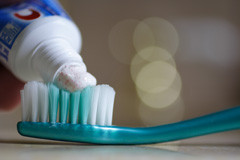Much more needs to be done to improve the oral health of Māori according to a publication launched at the Copthorne Hotel, Waitangi on Friday 25 March 2011 at the annual conference of Te Ao Marama, the New Zealand Māori Dental Association.
The new book, entitled Oranga Waha – Oral Health Research Priorities for Māori demonstrates priorities for improvement of the current poor oral health of many Māori. Funded by the Ministry of Health and the Health Research Council of New Zealand it sets out a research agenda to determine the best pathways for developing improved oral and dental health for Māori over the next few years.
“This book is one important step in doing something to address the serious state of the dental health of Māori,” says co-author Bridget Robson from Te Rōpū Rangahau Hauora a Eru Pōmare, University of Otago, Wellington.
“We didn’t realize how bad it was for some of our whānau. Some people hadn’t accessed dental care since school for cost and other reasons” says Vilma Hape from Ngāti Pāhauwera Hauora, one of the research partners. “People talked about resorting to drastic measures to deal with the pain from rotten teeth.”
Poor oral health is linked with general health problems. For example, gum disease is associated with diabetes, lung diseases, and heart disease. Some drugs can also dry out the mouth, increasing the risk of tooth and gum disease. “This means oral health is everyone’s business, not just that of dentists and dental therapists,” says Robson.
Other research shows that although New Zealanders spend about $1 billion a year on oral and dental health, only $178 million of that is publicly funded and only $9 million goes to low income adults. Robson says this is not nearly enough to address this pressing health issue which is affecting the lives of thousands of low income Māori of all ages.
This publication is a wide ranging partnership between the University of Otago, Wellington, several Māori health providers, NGOs and Te Ao Marama. For the first time it identifies research areas to improve the oral health of Māori, especially those individuals with special needs, disabilities and chronic conditions.
“Our research in the community, in hospitals and with Māori health services shows that Māori are not going to be content with minor changes around the margin of the system in relation to poor oral health,” says Robson. Some of the key recommendations of this report focus on:
- Increasing Maori providers for oral health services in primary care organisations, including the development of a Maori oral health workforce.
- Increasing oral health skills amongst non-dental providers to those Maori with disabilities or chronic conditions.
- The development of new models of oral health delivery to meet the needs of low income Maori and to make dental care much more accessible.
- Investigating the poor distribution of dentists nationally, and how to encourage dental professionals to work in low income or rural areas.
- Further investigating how environmental factors such as the marketing of food, tobacco and alcohol, and government regulations, affect Maori oral health and continuing health inequities.
The new publication also stresses the vital importance of monitoring, research and evaluation of progress in improving Maori dental health in coming years.
It says there is a risk that poor Maori oral health may remain hidden in statistics relating to the general population if this is not done, which makes it doubly difficult to make the necessary improvements. This is particularly so for those Maori with special needs and disabilities.
For further information contact:
Bridget Robson
Te Rōpū Rangahau Hauora a Eru Pōmare
University of Otago Wellington
Mob: 027 2409258
Bridget.robson@otago.ac.nz
Dr Pauline Koopu
Te Ao Marama (NZ Māori Dental Association)
Mob: 027 4543406
